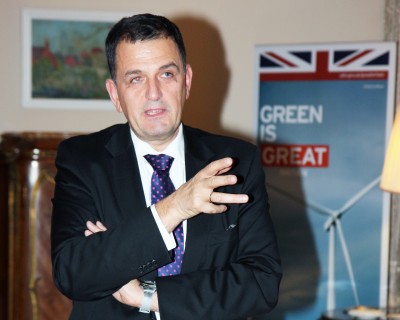14th November 2013 Warsaw, Poland
Warsaw meets the World at COP – All that Energy is GREAT
The week sees the world of Energy policy meet in Warsaw in a specially converted National Stadium which becomes a Global Energy summit for the next two weeks.
The Emerging Europe GREAT campaign has an action packed fortnight of events and activity promoting the inevitable business opportunity which emerges in its largest sector – seminars, webinars, receptions and the largest ever UK Roadshow to promote the region’s energy agenda – COP 19 a catalyst for Emerging Europe’s new energy programme.
On day one of a busy week we took the opportunity to talk to HMA Robin Barnett, HMA Warsaw and Director of the GREAT Emerging Europe Network.
Climate Change – Impact a Real Issue
The recent IPCC report (fifth assessment) was unequivocal. The report warned that without significant emissions reductions, the world is on course for average temperature rises in excess of 2 degrees [above 19th century levels] and possibly as much as 4.8 degrees by the end of this century. It is clear that we all need to take urgent action to mitigate the impact of climate change. Otherwise we will bequeath to our children a world much worse than the one in which we grew up.

This means action from governments. But it also means action from business. Why?
i) Because without the formidable organisational, creative and financial muscle that business brings, we cannot seriously address climate change. Governments cannot do this alone.
ii) Because businesses will be affected as they seek to adapt to changing patterns of extreme weather. We have already witnessed some of the impacts. Take the Thai floods. A Honda factory was shut-down by severe flooding, and Toyota and Nissan operations were affected too. Hard-drive production by several tech companies was affected. This has consequences far beyond Asia. It matters for our businesses and consumers in Europe too.
iii) And, more positively, because acting on climate change presents significant opportunities for business. The potential rewards are striking: the global low carbon and environmental business market is worth over €4 trillion a year. It is expected to grow at over 4% a year. Global clean energy investments alone have increased by 669% to $269 billion a year.
A double win – Managing Risk : Driving Prosperity
So tackling climate change is a top priority for the UK Government. Not just because the risks are too great if we do not act. But because in tackling climate change, we can drive forward prosperity and growth. That is why the UK Government is working so closely with business to identify innovative solutions – be it on shale gas potential; nuclear; renewables; or smart metering.
During the next two weeks, at COP here in Warsaw, the British Government’s top aim is to keep progress towards a global agreement in Paris in 2015 on track. Securing a clear commitment from countries to submit their emissions targets over the next two years will be the major challenge.
It is vital that we work with partners – in government and business – to reduce those emissions.
Smart Energy – a GREAT Bilateral Opportunity
Like Poland, the UK faces many challenges in the development of our energy market. Efficient grid access and distribution are key aspects of this. The UK Government’s vision is for every home and smaller business in Great Britain to have smart energy meters. This will play an important role in the UK’s transition to a low-carbon economy.
It will help us to meet some of the long-term challenges in ensuring an affordable, secure and sustainable energy supply. There is much we can learn from each other.
We must work together to deliver consumer value through innovation. And to build a modern energy market. One where regulators collaborate with industry to deliver a sustainable grid for the future. And one where consumers benefit, at a time when the cost of living, including rising energy prices, is a political challenge for us all. Smart meters represent part of the solution.
Putting control in the hands of the consumers, so they can act on energy costs, not just observe them. ‘In home displays’ will give near real time information in pounds and pence, zloty and groszy. This will help enable consumers to better manage energy consumption, save money and secure sustainable energy supply. And smart metering will also open up opportunities for innovation in new products and services.
In the UK, our aim is for all homes and small businesses to have smart meters by 2020. Between now and 2020 energy suppliers will be responsible for replacing over 53 million gas and electricity meters. Over the next 20 years the installation of smart meters will provide £6.7 billion net benefits to the UK: the programme will cost £12.1 billion and provide £18.6 billion in benefits.
So, there is a lot happening. And we are making good progress. There is much opportunity across the region’s energy map. We need to make sure the UK and Poland work together to make the most of the opportunity.
Energy is GREAT – Opportunity Library – click here and have a look at the first 5 presentations for more information
Contact Bartosz Koziński, Director, Energy Unit, UKTI Poland